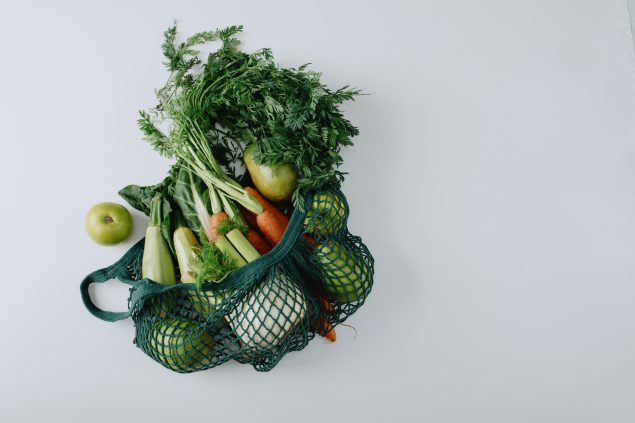Fruits and Vegetables: Keep Them Fresh to Keep You Healthy

Fresh produce is a great option for a quick snack or a nutritious meal.
These tips on storing fresh fruits and vegetables will help you cut down on food waste and trips to the grocery store. You’ll save money while keeping fresh food on hand for your whole family.
Fruits and vegetables are key to good nutrition. Foods like apples, broccoli, and green beans have the vitamins, minerals, and fiber your body needs to stay strong and healthy.
When you stock up on canned or frozen fruits and vegetables, buy items made without added sugar, fat, and sodium. They make much healthier options!
You can buy all kinds of fruits and veggies: canned, dried, or frozen. These options can be easy to find and are great for stocking your pantry and freezer. Fresh produce is also a great choice but storage can be difficult. The challenge with fresh foods is keeping them fresh.
Anything fresh can spoil quickly. Think about the last time you bought bananas. They may have seemed to turn brown overnight. Not to worry! Fresh foods can last longer if you store them right. Check out our top 6 tips for keeping your fruits and vegetables ready to eat.
1. Soak Up Extra Water
Too much moisture can cause fresh foods to spoil. Some items, like lettuce, naturally give off moisture over time. To keep some foods from spoiling, don’t let their liquids collect. It’s best to store foods like lettuce and leafy greens with something to soak up extra water. This could mean putting greens in a container with a paper towel. You could also use a cloth vegetable bag. Either way, make sure you store leafy greens in the refrigerator so they last longer.
2. Limit Air
Air makes some fruits and vegetables turn brown. Apple slices are one example. It won’t hurt you to eat browning produce, but most people don’t prefer it. Lemon juice can help foods keep their color. Squeeze some lemon juice over sliced fruits and veggies to protect them from the air. You don’t have to worry about a sour taste either. When you’re ready to eat, just rinse off the lemon juice.
If you enjoy on-the-go snacks, try raw carrots or cucumbers. They are easy to pack in a backpack or purse.
3. Stop Water Loss
While water can cause some fresh foods to spoil, it can help others stay crisp. You can cut hardy vegetables like celery and carrots into bite-sized pieces for a healthy snack. Once they’re cut, place them in a bowl of water and store everything in the fridge. This will keep your vegetables from losing moisture and becoming wilted.
For fresh berries, water and a little vinegar can keep them from getting mushy. Wash berries in a mixture of 1 part vinegar to 3 parts water. For example, 1 cup of vinegar and 3 cups of water. The vinegar and water mix helps remove grime, spores, and bacteria. Make sure you rinse your berries with clean water to remove any leftover vinegar. Pat them dry and store your berries in the fridge.
4. Separate Certain Foods
Some fruits and vegetables give off gases, like ethylene, as they ripen. These gases can cause other foods to age faster than usual. Fruits and vegetables that release gases include mangos, peaches, and pears. Other foods like cucumbers, raspberries, and strawberries can be affected by the gases and ripen too fast. To stop foods from aging too quickly, it’s best to separate certain items. Try storing gas-releasing foods on a shelf separate from gas-sensitive ones.
5. Purchase Underripe Fruits and Veggies
When grocery shopping, everything you buy doesn’t have to be ready to eat. Things like tomatoes, avocados, and cantaloupe continue to ripen after they’re picked. Try purchasing some items when they’re still a little firm. They will soften over time, and you’ll have fresh produce for weeks on end.
6. Pick the Right Temperature
When it comes to storing fresh foods, temperature matters. The best storage temperature depends on the item you want to preserve. Most fruits and veggies do best in the refrigerator. Your refrigerator should be set to 40°F or less. You can use a crisper drawer to keep items fresh. The crisper helps fruits and vegetables get the right amount of air and keeps them from losing too much water. The crisper also keeps excess water from collecting. Remember, extra water can cause some foods to spoil.
Not all fresh foods need to be in the cold, though. You shouldn’t refrigerate things like underripe bananas and avocados. The cold can interrupt fruits’ ripening process and give fruit an unappealing look and texture. Store these fruits at room temperature.
Eating for Health
Healthy eating is an important part of caring for your body. Fruits and vegetables have many of the vitamins and minerals your body needs. Fresh produce is a great option for a quick snack or a nutritious meal. Stored the right way, some fresh fruits and vegetables can last for weeks. With the tips above, you can keep lots of fresh foods on hand. You’ll also cut down on food waste and trips to the grocery store, saving you time and money!